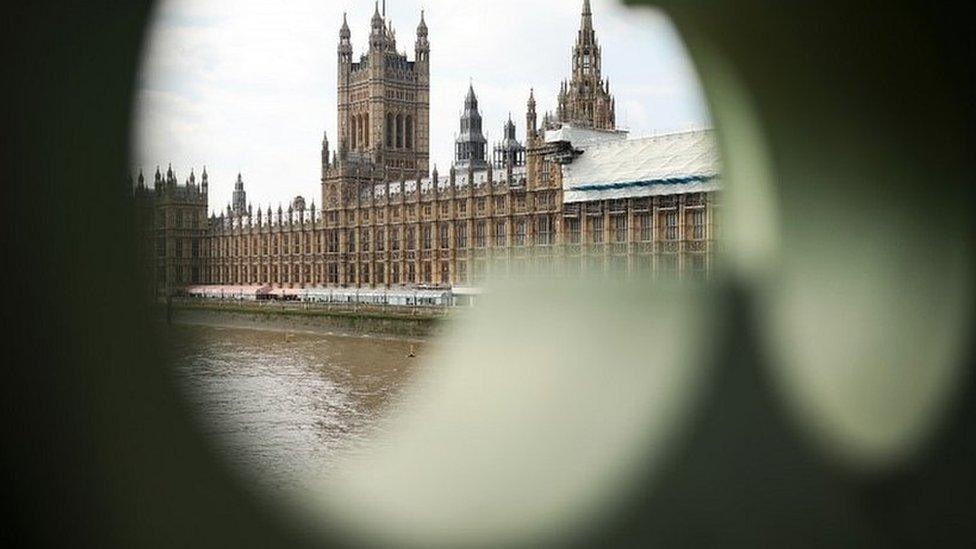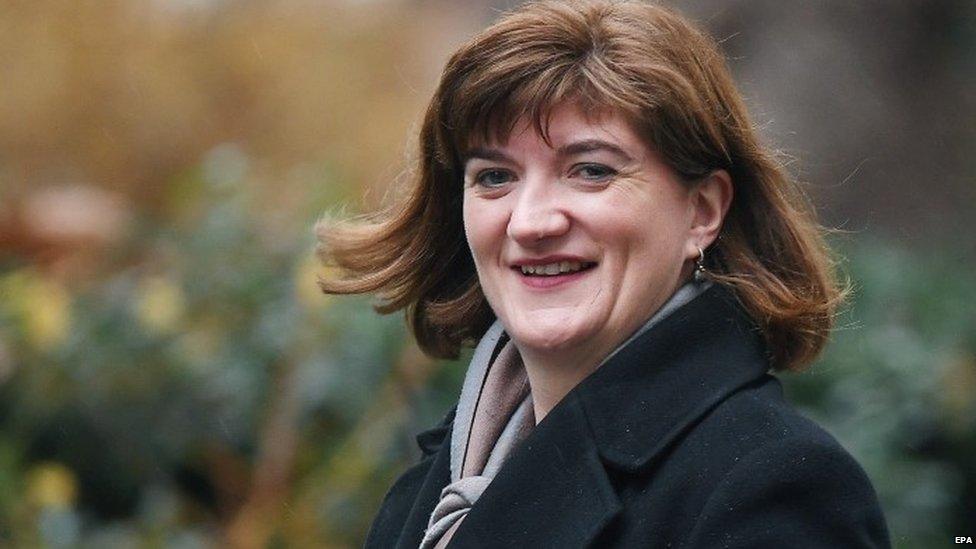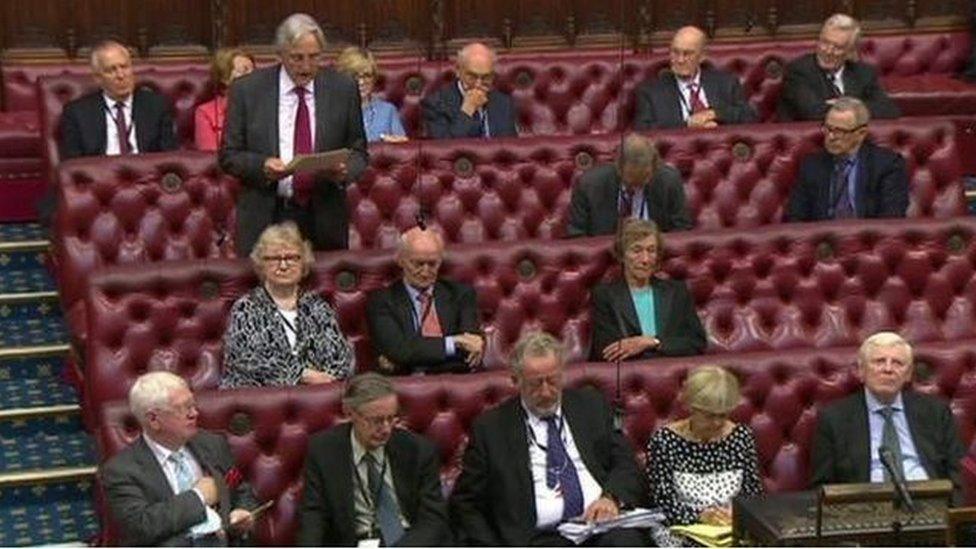The week ahead in Parliament
- Published

This week the Commons gave ministers the novel experience of getting a Brexit bill through unscathed, indeed with ease.
Next week the Withdrawal Agreement Bill (the WAB, in Westminster-speak) arrives in the House of Lords where it won't be so easy.
Armed with their new Commons majority, the government had no problems from MPs. But even after a steady increase in the number of Conservative peers (with more arriving this week), they do not have the same clout in the upper house.
Peers have plenty of concerns they want to press, even if they will be conscious that they are dealing with ministers who can brandish a fresh mandate from the voters.
So watch this space - it is a good bet that changes will be made, and the Bill will have to go back before MPs, so that they can be accepted or rejected.
Meanwhile, after a week spent on the WAB, MPs will return to debating the legislative programme announced back in December, in the post-election Queens Speech. They will have a series of debates on various themes, culminating in a series of votes on Monday 20 January.
Elsewhere, the parliamentary programme seems oddly thin; there are no Westminster Hall debates scheduled yet, there are no Commons select committees - although the Lords Committee system has just sprung into life, and two of its committees are rushing out reports on the ramifications of the WAB, to feed into next week's debates - so the action is mostly concentrated on the main chambers.
One sub-plot to keep an eye on is the jockeying for position by contenders to chair the various Commons select committees - ex-chairs and aspiring chairs will be strutting their stuff at every opportunity, wooing the new intake of MPs in person and on twitter, and generally doing their best to impress.
A provisional share out of committee chairs between the parties has been agreed, I'm told, with the Transport Committee to be chaired by a Conservative, rather than by Labour, which is bad news for its previous chair, Labour's Lillian Greenwood.
A good bet to replace her is Huw Merriman, the senior Tory on the previous committee. With buses emerging as a big issue, and decisions on the future of HS2 looming, this should be a high profile role.
Science and Technology will now have a Conservative, rather than a Lib Dem, in the chair. And a lively race is developing for the Foreign Affairs Committee - with the chair in the last parliament, Tom Tugendhat, vying with his predecessor, Crispin Blunt, and maybe with a senior Tory committee stalwart, John Baron.
Keep an eye out for auditioning during suitable question times and ministerial statements over the next few weeks.
There are plenty of other tempting vacancies, where there is no "incumbent" to block the way: Health, Work and Pensions, Welsh Affairs, International Development and Environmental Audit are all open.
There's always also the prospect that some of the senior Labour figures who sat out the Corbyn leadership on the committee corridor might now be summoned back to the shadow cabinet, creating more vacancies - although the timing here is awkward, and they might find they run for the committee chairs before a new Labour leader is in place - the timetable for committee elections is not yet announced.
Here's my rundown of the week ahead:
Monday 13 January

Culture Secretary Nicky Morgan will take her seat in the House of Lords
The Commons opens (14:30 GMT) with an hour of Housing, Communities and Local Government questions.
After this, expect the usual crop of post-weekend Urgent Questions (UQs) or statements, although it will be interesting to see if Speaker Lindsay Hoyle decides to rein back on the number of UQs granted by his predecessor.
Then MPs will resume their debate on the Queen's Speech, with the theme of the day "Britain in the World."
A chance for the would-be chairs of the Foreign Affairs and International Development committees to flourish their plumage - and also for more of the new intake to make their maiden speeches.
The day's adjournment debate, led by the SNP's Patrick Grady, is entitled "Official Development Assistance target". It is a pre-emptive strike against rumoured plans to merge the Department for International Development (DFID) into the Foreign Office.
Mr Grady wants to highlight the importance of the cross-party consensus around maintaining the target of spending 0.7% of the UK's GDP on aid - which he argues is best delivered through a stand-alone department.
In the Lords (14:30) the first business is the introduction of two new peers, who also happen to be senior ministers - Baroness Morgan of Cotes and Lord Goldsmith of Richmond Park, the artists formerly known as Culture Secretary Nicky Morgan and international development minister Zac Goldsmith, who lost his seat at the general election.

Peers will get their teeth into the PM's Brexit bill for the first time
Questions to ministers range across the freeze in working age and children's benefits, support for young carers, UK Aid's nutrition-sensitive programmes and educational provision at the planned D-Day memorial at Ver-sur-Mer.
After that, peers turn to the Second reading of the European Union (Withdrawal Agreement) Bill, fresh from the Commons. This is the bill which puts the Withdrawal Agreement with the EU into UK law.
So far, 68 peers have put in to speak. Look out for Labour's Lord Dubs - author of an amendment which would give child refugees the right to join their families in the UK, a provision which was in the earlier pre-election version of this bill, but which has now been removed.
He looks set to try to put it back in again, and send the Bill back to MPs to see if they will relent, and keep it in.
Expect more amendments to restore provisions on parliamentary scrutiny of Brexit, which were also in the previous version of the Bill, and to curb some of the powers it gives to ministers.
On the crossbenches there is particular concern about a power for ministers to direct the courts on the interpretation of European law, which sounds very technical but which its critics believe is both an over-reach of executive power and likely to result in confusion about what the law actually says. In due course, expect super-lawyers like Lord Pannick and Lord Anderson of Ipswich to weigh in.
Actual votes on these matters will probably not come this week. Peers don't tend to force issues to a vote at Committee Stage, preferring to probe the government's intentions and return at Report Stage with carefully honed amendments.
So this week will see the probing, but not the main battles over the detail of this bill.
Look out, too, for maiden speeches from Gavin Barwell - formerly Theresa May's former chief of staff, and the former Labour MP John Mann - who is sufficiently maverick that he may not stick to the convention that new peers keep their maiden offerings uncontroversial.
Tuesday 14 January
Lord Chancellor Robert Buckland and his ministerial team will be taking Justice Questions when the Commons opens for business at 11:30 GMT, after which MPs will continue the Queens Speech debate, with the subject of the day education and local government.
In the Lords (14:30) ministers field questions on nuclear power capacity, the plans of the Constitution, Democracy and Rights Commission to engage with civil society, and the effect of vaping on public health.
Then peers will turn to the first of their three days of Committee stage debate on the European Union (Withdrawal Agreement) Bill. Brexit minister Lord Callanan leads for the government.
Wednesday 15 January
Welsh Question Time, at 11:30 GMT, offers a debut for the newly promoted Secretary of State for Wales, Simon Hart. That's followed, at midday, by Prime Minister's Question Time, which the new Speaker has restored to its supposed half-hour duration.
Then the debate on the Queen's Speech continues, with the subject for discussion "A Green Industrial Revolution".
The day ends with an adjournment debate led by the Conservative Lucy Allan on the Ockenden review of maternity care at Shrewsbury and Telford Hospital NHS Trust - that's the inquiry by senior midwife Donna Ockenden into baby deaths, which has examined more than 600 cases.
In the Lords, Committee proceedings on the European Union (Withdrawal Agreement) Bill begin early, at 11.00 GMT, with a break for question time at 15:00 - when the subjects include safe staffing in social care and the NHS, the situation in Hong Kong, and the COP26 climate talks in November. Then the House returns to the detail of the bill.
Thursday 16th January
The Commons day begins, at 09:30 GMT, with Digital, Culture, Media and Sport questions, minus newly ennobled Secretary of State Nicky Morgan, who will take questions in the Lords every month instead.
Her deputies, Nigel Adams, Helen Whatley and Matt Warman deputise - and Labour has a new shadow secretary, following the departure of Tom Watson, who stood down at the election. Ex-Corrie actress Tracy Brabin makes her debut.
At 10:10 GMT, the Attorney General Geoffrey Cox and his team take questions, and then comes the weekly statement on future Commons business from the Leader of the House, Jacob Rees-Mogg. Look out for his developing double act with Labour's Chris Bryant.
The debate on the Queen's Speech continues, with a day devoted to health and social care, and the week ends with an adjournment debate on protection for new home buyers, led by Labour's Kate Green.
In the Lords, at 11:00 GMT, ministers face questions on how the Home Office processes asylum claimants when they say they have been the victim of child trafficking, on the completion of the England Coast Path and on the Convention on the Elimination of all Forms of Discrimination Against Women.
The main business is Day Three of committee consideration of the European Union (Withdrawal Agreement) Bill. The Report Stage, when any genuine attempts to amend the bill would take place, begins on Monday and concludes on Tuesday.
The day's topical short debate is on the implications of the use of drones to assassinate Qasem Soleimani for existing agreements on the use of drones. The debate is led by the Conservative, Lord Hodgson of Astley Abbotts.
Neither House sits on Friday.
